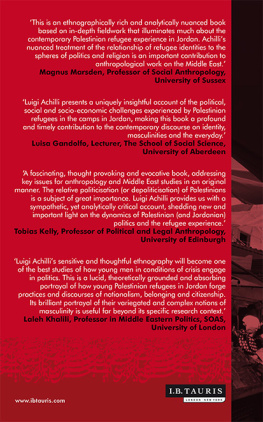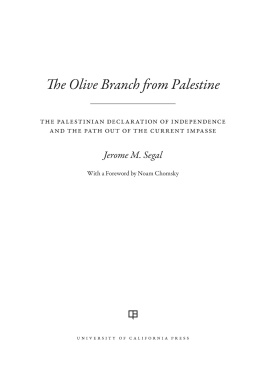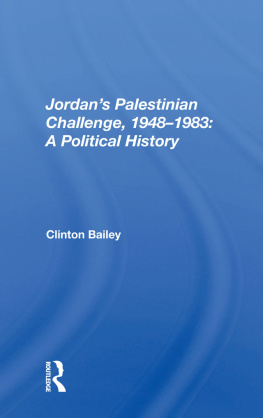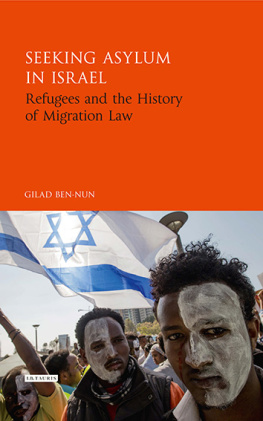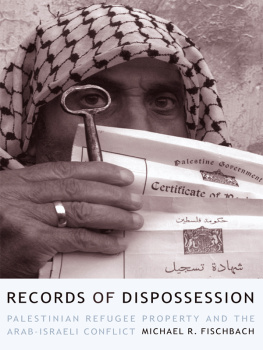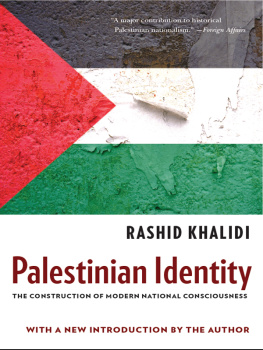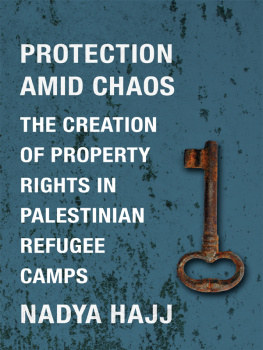
Luigi Achilli is Research Assistant at the Robert Schuman Centre for Advanced Studies (MPC), Florence, Italy. He holds an M.A. and a Ph.D. in political anthropology from the School of Oriental and African Studies (SOAS). His research and writing focus on everyday forms of political engagement and disengagements, citizenship, nationalism, Palestinian issues, migration, refugees and refugee camps, and the politics of space.
A general source of inadequacies in all my material, whether photographic or linguistic or descriptive, consists in the fact that, like every ethnographer, I was lured by the dramatic, exceptional and sensational [] I have also neglected much of the everyday, inconspicuous, drab and small-scale in my study of Trobriand life. The only comfort which I may derive is that [] my mistakes may be of use to others.
(B. Malinowski, Coral Gardens and Their Magic, p. 462.)
PALESTINIAN
REFUGEES AND
IDENTITY
Nationalism, Politics and the Everyday
L UIGI A CHILLI

Published in 2015 by
I.B.Tauris & Co. Ltd
London New York
www.ibtauris.com
Copyright 2015 Luigi Achilli
The right of Luigi Achilli to be identified as the author of this work has been asserted by the author in accordance with the Copyright, Designs and Patents Act 1988.
All rights reserved. Except for brief quotations in a review, this book, or any part thereof, may not be reproduced, stored in or introduced into a retrieval system, or transmitted, in any form or by any means, electronic, mechanical, photocopying, recording or otherwise, without the prior written permission of the publisher.
Every attempt has been made to gain permission for the use of the images in this book. Any omissions will be rectified in future editions.
References to websites were correct at the time of writing.
Library of Modern Middle East Studies 158
ISBN: 978 1 78076 911 0
eISBN: 978 0 85772 904 0
A full CIP record for this book is available from the British Library
A full CIP record is available from the Library of Congress
Library of Congress Catalog Card Number: available
To my mother
CONTENTS
LIST OF ILLUSTRATIONS
: al-Wihdat official map (source: UNRWA)
: al-Wihdat today, aerial view (source: Google Earth)
: al-Wihdat (source: Jihad Nijem)
: Shelters with zinc roof (source: Jihad Nijem)
: Narrow alley (source: Jihad Nijem)
: Women in the market (source: Jihad Nijem)
: Refugee camps in Jordan (source: UNRWA)
: UNRWA field office in al-Wihdat (source: Jihad Nijem)
: UNRWA schools (source: Jihad Nijem)
: Sumayya Street (source: Jihad Nijem)
: al-Wihdat's vertical expansion (source: Jihad Nijem)
: al-Wihdat Tahtwir (source: Jihad Nijem)
: al-Wihdat, al-Nadi Street (source: Jihad Nijem)
: Shops in the suq al-wihdat (source: Jihad Nijem)
: Stands in the suq al-wihdat (source: Jihad Nijem)
: suq al-wihdat (source: Jihad Nijem)
: Children playing in the street (source: Jihad Nijem)
: Children and shabab in the street (source: Jihad Nijem)
: Football field in the Nadi al-Wihdat (source: Jihad Nijem)
: Coffee shops (source: Jihad Nijem)
: Fariq al-wihdat (source: Jihad Nijem)
: Al-Wihdat fans (source: Jihad Nijem)
: Al-Faisaly fans waving Jordanian hatta (source: Jihad Nijem)
: Jordanian flag painted on a shelter in al-Wihdat (source: Jihad Nijem)
ACKNOWLEDGEMENTS
It is my great pleasure to thank all the people without whom this book would not have been possible.
First and foremost, I want to express my deepest gratitude to the community of Al-Wihdat, which welcomed me with warm hospitality, endless generosity and delicious food. Rarely have I encountered such kindness and eagerness to help someone who was, at first, a stranger.
A special thanks to the shabb of Al-Markez and the Nadi Al-Wihdat, where I spent a large part of my days in Jordan. Without their help I would not have been able to carry out this research. They treated me like a brother, opened their homes to me, and taught me everything I know about daily life in Wihdat. They told me stories about Palestine, their families and the camps, and had infinite patience with my less-than-perfect Arabic. My eternal gratitude goes to them. I am particularly thankful to Jihad Nijem, who assisted me during my initial visits into the Camp and still helps me now, as a priceless source of intellectual guidance and practical support. Most importantly, he is a real friend. I mention with appreciation Abdallah Hussein and his family, whose help and friendship have been precious in so many ways. I also thank Mohammed Assaf, whose good humour and knowledge of Al-Wihdat were invaluable to this project. I am greatly indebted to Rami, Abdallah Sous, Najar, Haddad, and all other shabb and their families whose names are too many to mention here but are firmly fixed in my memory who so kindly and patiently accompanied me in my pilgrimages to the Camp and let me into their daily lives. To Griso, who taught me the secrets of the nous ras kharouf; and to Anas, who shared with me his passion for homing pigeons. I am indebted to the people of the mouqe al-wihdat, with a special thanks to Ibrahim and his family for hosting me and feeding me what must be the best mansaf in Jordan.
I also want to thank my friends in the Souf Camp. A number of people were extraordinarily giving, and I especially owe gratitude to the Al-Jwabreh family, and in particular to Mohammed, whose humour and companionship enriched this study.
I am profoundly grateful for my mentors and teachers. Foremost among them is Magnus Marsden, who has made the undertaking of this project both a tremendous challenge and a true pleasure. His commentary, critique and advice have made this book infinitely better. Id like to thank Jalal Husseini, my intellectual mentor in the field and a dear friend, for whom there are no adequate words to express my gratitude. I also give my deep and sincere thanks to Laleh Khalili: her ability to combine incisive critique with supportive comments has been of great value to me. Above all, I owe Raymond Apthorpe a very special thanks for the time he has so generously spent on my book and his enormously encouraging feedback.
My friends and colleagues have encouraged me, shared their knowledge with me, and greatly helped me with their erudition and sharp criticism. Among them, I would like to especially thank Diana Ibanez, whose friendship (and correspondence) during my fieldwork and after it enriched my research and ethnographic experience, helping to resolve my doubts, academic conundrums and a PhDs particular life challenges. In Jordan, I am extremely grateful to Myriam Ababsa, Norig Neveau, and all the researchers and staff of Ifpo-Amman. I am also especially indebted to Lucas Oesch. They have been and still are the perfect companions for entertainment, academic exchange, and all-around amusement.
To Alice Massari goes my eternal gratitude for the incalculable help she has given to me in writing this book. This book would have not been possible without her. I am also in debt to my grandmother, Raffaella Pansini, a veritable source of inspiration. Finally, my love goes to my daughter, Mariangela, who has made my life as happy as it is today.
INTRODUCTION
It is a late afternoon in April. I decide to pass by al-Wihdat Youth Club to visit a few friends. Located in the homonymous Palestinian refugee camp established in 1955 on the outskirts of Amman, and then fully incorporated by the urban expansion of the capital of Jordan the club is popular in the region today for being home of the well-known al-Wihdat football team. As I enter the building, I step on a big flag of Israel engraved in the ground just after the main gate. Put there for the purpose of being trampled on, the image is fading rubbed out by the feet of frequent passers-by. On the other side of the entrance, in a big atrium, a couple of people sink rather lethargically into a brown-coloured sofa of synthetic leather. A smell of nicotine and a faint aroma of coffee permeate the room. Over the past few months, I have come to know both of them: Rami, in his early 30s, who has made quite a reputation among his friends for being atheist and communist; Abu Omar, a man whose religious zealotry has earned him the reputation of being a man of faith. The two men, who have known each other for a long time but who I have rarely seen together alone, are chatting. Their voices struggle to make their way to my ears amid the invocations of a preacher shouting from the battered speakers of a radio located somewhere in the spacious lobby of the club. I decide to join them and listen to their discussion.
Next page
